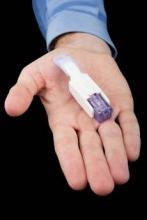HYATTSVILLE, MD. – Inhaled insulin will probably become available as a treatment option again, with a Food and Drug Administration advisory panel’s recommendation to approve an orally administered dry powder recombinant insulin formulation for the treatment of both type 1 and type 2 diabetes.
At a meeting on April 1, the FDA’s Endocrinologic and Metabolic Drugs Advisory Committee voted 13-1 that the safety and efficacy data for the inhaled insulin, delivered with an inhaler, supported approval for treatment of adults with type 1 diabetes; they voted 14-0 that the data supported approval for treatment of adults with type 2 diabetes. Panelists had unresolved concerns about safety, including the potential for lung cancer and adverse pulmonary effects, acute bronchospasm in people with asthma, and deteriorating pulmonary function over time, which they said should be closely monitored after approval.
Panelists also pointed out that the results of phase III trials indicated that the inhaled insulin product was not as effective as traditional insulin, and that it would not be appropriate for all patients with type 1 and type 2 diabetes. They did note, however, that there was a need for more treatment options and that an inhaled insulin could be useful for certain groups of patients, such as elderly or disabled patients who have physical impairments and have difficulties with injectable insulin and patients who refuse to use needles – and when a dose of insulin is needed to lower blood glucose between meals.
The proposed indication for the Technosphere insulin inhalation system – which provides insulin in cartridges, delivered with the "Gen2" inhaler – is to improve glycemic control in adults with type 1 or type 2 diabetes. The system’s rapid-acting insulin works faster and has a shorter duration of action than regular human insulin or rapid-acting analog insulins, according to the manufacturer, MannKind Corp.
It is administered immediately before or within the first 20 minutes of starting a meal and is used with basal insulin in patients with type 1 diabetes, and it can be used with oral glucose-lowering medications or basal insulin in patients with type 2 diabetes, according to the company, which plans to market the product as Afrezza if approved.
The orally inhaled insulin marketed as Exubera was approved by the FDA in January 2006 for treating adults with type 1 and 2 diabetes, but Pfizer took it off the market in 2007 because of poor sales.
The FDA rejected the approval of the MannKind inhaled insulin twice before because of issues with efficacy and the device, and it asked the company to conduct two new phase III studies with a new inhaler.
In the study of patients with type 1 diabetes, those treated with Afrezza had a mean 0.20–percentage point drop in HbA1c from baseline at 24 weeks, compared with a 0.42–percentage point drop among those on insulin aspart. In the study of patients with type 2 diabetes who were on metformin or at least two other oral diabetes drugs, those treated with Afrezza had a mean 0.84–percentage point drop in HbA1c from baseline, compared with 0.41 at 24 weeks in those on placebo. In trials, the most common adverse events were a dry, transient cough and transient changes in pulmonary function. Lung cancer rates were similar to what would be expected in the general population, according to the company. Hypoglycemia was slightly lower among those on Afrezza in both studies.
There have been four lung cancers in patients treated with Afrezza in clinical trials, including two cases in patients with no smoking history. Since the product delivers a high level of insulin to the lungs, and insulin may activate growth receptors in the lungs, the panel agreed this was a significant issue that should be followed in postmarketing studies. The company has proposed a prospective observational registry of patients to track the incidence of primary lung cancers, as well as other malignancies and serious pulmonary, allergic, and hypoglycemic events that require medical intervention. Labeling would recommend that spirometry be done every 6 months during treatment.
Voting for approval, panel chair Dr. Robert Smith, professor of medicine at Brown University, Providence, R.I., said that inhaled insulin "represents a drug that will serve some patients that are not effectively served by currently available forms of insulin." The data about the potentially serious adverse effects "were not strong enough that I feel it is imperative to resolve those questions" before marketing, he added, but stressed that these safety issues, including the potential for lung cancer and deteriorating lung function, are "very, very important to follow up."



